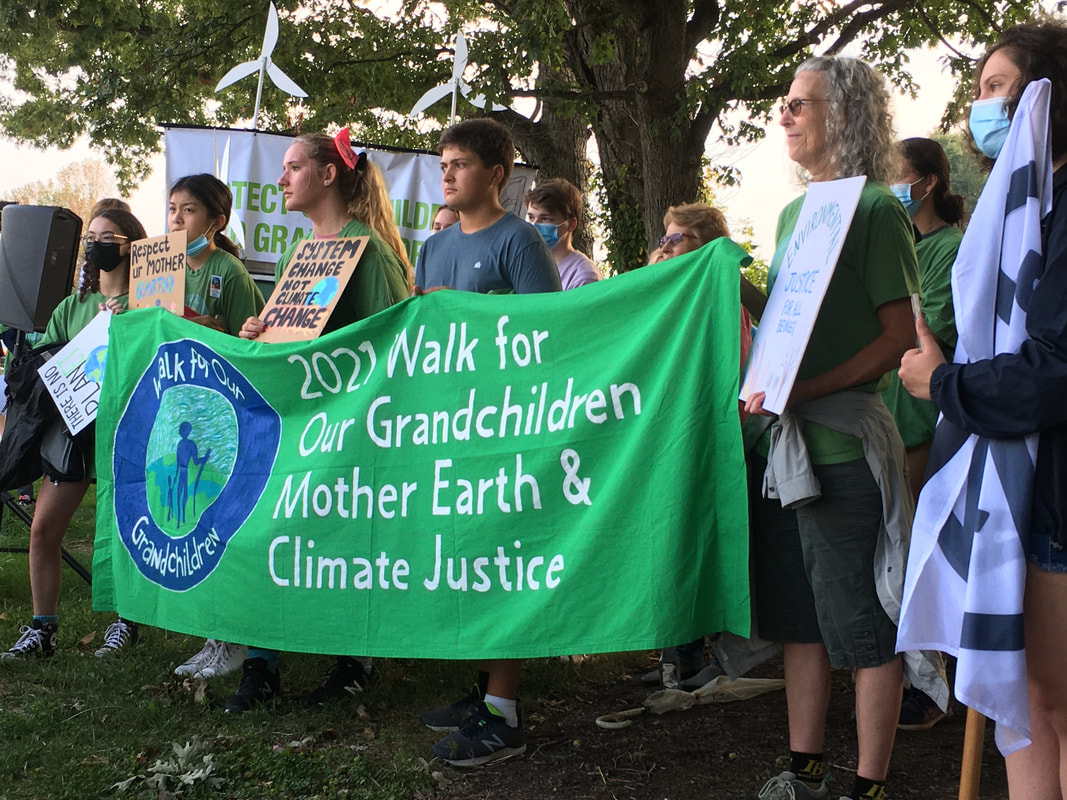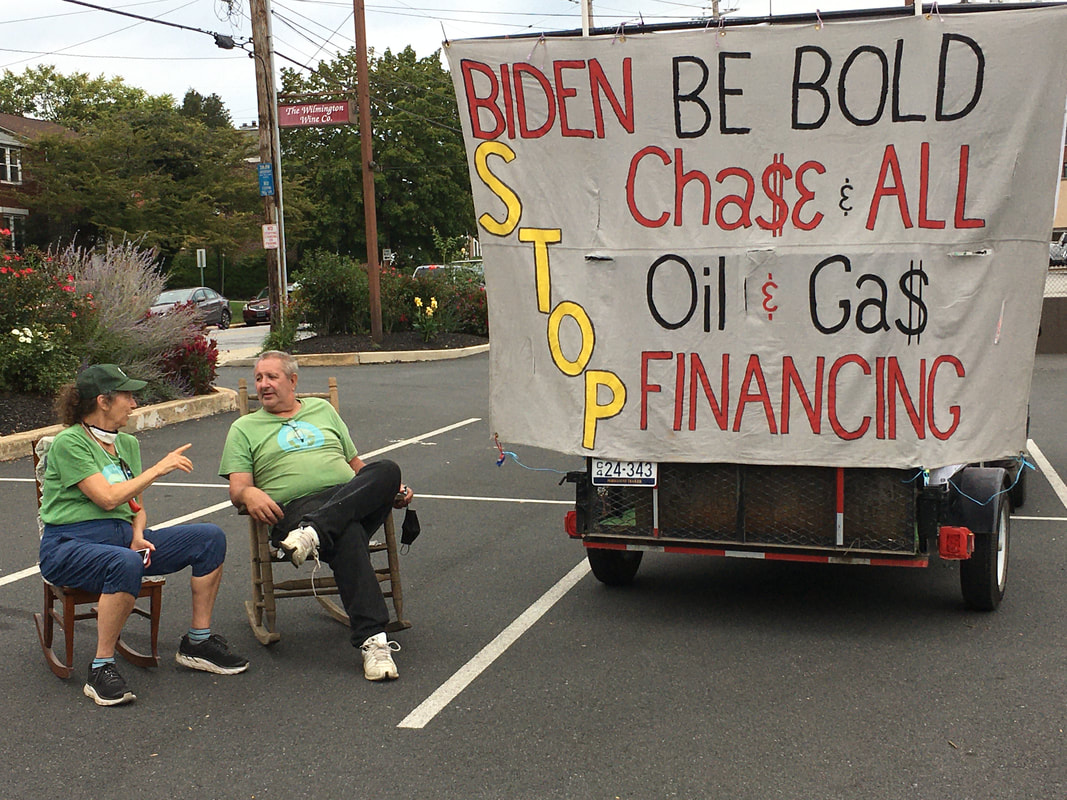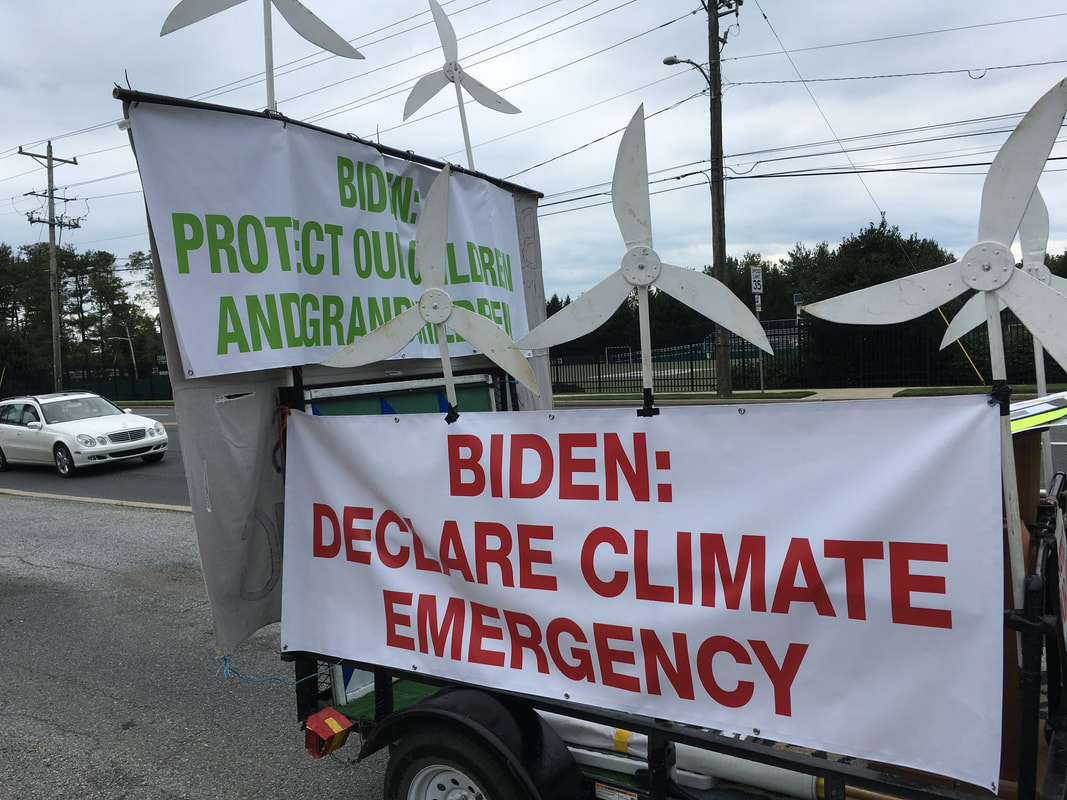Around the original date of the trial we had planned a 6-mile walk from the bank to Pres. Biden’s house to deliver a box of letters and drawings from children asking him to protect their future, plus a rally at the end, plus a People’s Climate Tribunal the next day.
There were so many highlights it’s hard to mention them all, but here are a few:
One of the best things about the march was that Karen and John, the local members of our group, had organized youth at several high schools to join us as we passed by on the route specifically designed to include them, so at every stop our little band grew larger and more enthusiastic. It was thrilling.
Individuals joined along the way, too, who either knew about it beforehand or who just saw us and wanted to be part of our action, which called on President Biden to stop fossil fuel construction through executive action (to the extent possible) and to declare a Climate Emergency. One demand was that he cancel the cross-border permit from Canada to the U.S. for Enbridge’s Line 3 tar sands pipeline across indigenous treaty lands in Minnesota – the same permit he canceled for the Keystone XL pipeline on his first day in office. Tar sands is the dirtiest energy on the planet.
Throughout the day, our indefatigable Maury Johnson drove through the streets pulling a trailer festooned with the signs you can see in the photos below, greatly increasing our visibility.
When we arrived at the rally site, young people at the front paid rapt attention to the speakers (pictured in photo at top), who included Zulene Mayfield, who has been fighting the biggest trash incinerator in the country in her low-income, majority African American town outside Philadelphia for 30 years. She emphasized that “We are one,” not in a kumbaya kind of way, but in a realistic and practical way we must act on if we hope to save ourselves from the worst ravages of air pollution and climate chaos. Charito Calvachi-Mateyko, co-chair of the Delaware Civil Rights Commission, emphasized the terrible conditions in which many Latino workers in the U.S., especially farmworkers, must toil in an increasingly hot and polluted world.
Then four high school students spoke, the first one starting with the fact that in a year or two or three they will all be voters, and they will vote out any politician who doesn’t take the climate crisis seriously, and act on it.
You can hear their speeches here, here, here.
A Secret Service agent came to the start of the walk to talk to us, so we were on their radar. As we expected, the Secret Service outside Biden’s house declined to accept our beautiful box full of letters and drawings, so we will try to mail it to him. The young people who attempted the delivery spoke movingly of how the march, rally, and thwarted attempt had affected them.
Next day we held our People’s Climate Tribunal in front of the courthouse, “indicting” Chase Bank for being the largest funder, by far, of fossil fuel development. I took testimony on Zoom from climate scientist Tony Ingraffea, in which he explained that he started his career working for the oil and gas industry, then did a 180 when the use of horizontal gas fracking became widespread and produced leaks and venting that made it worse for the climate than coal. He publicly tied the climate crisis to funding by the big banks. You can listen to the 10-minute recording here.
Dr. Walter Tsou, with Physicians for Social Responsibility, spoke movingly of the public health impacts of burning fossil fuels. Others highlighted the local impacts of stronger storms and some remarkable successes for climate legislation in Delaware.
And one of the young people who spoke at the rally the day before spoke again, just before hustling to class for a test. Jack Thompson is 16 years old and full of righteous fury he directed at Chase Bank. “I would like to start,” he said, “by talking about how it feels to be a young person watching the people in positions of power completely betray your interests…You have the nerve to sit in your office down the street and talk down to me and my generation about how we’re too young to understand the economic factors that result in you refusing to stop funding fossil fuel projects and companies. I am sick of it. We are sick of it. You are single-handedly killing a generation…[If you don’t change] My generation will never forgive you.”
One low-light was that we tried to deliver a letter to Delaware’s senior senator, Tom Carper, calling for Congress – and him specifically – to take emergency action on the climate crisis. Through the security guard at the door, Carper’s office declined to accept the letter. Despite my lack of faith in most elected officials, I was still shocked that an elected official would so brazenly ignore a letter from his own constituents. Further on, Sen. Coon’s office accepted the letter.
The two days strengthened the bonds we have for each other even more, and built new bonds with dozens of young people, and we are looking forward to returning to Wilmington on November 12 – which, as our chief organizer Steve Norris noted, is the last day of the COP 26 climate conference in Glasgow. So we have a new slogan: If you can’t go to Glasgow, come to Wilmington!
Our two days on the climate fighting trail were bittersweet, as they included announcements of both the final cancellation of the PennEast fracked gas pipeline and the completion of Line 3 and its start-up on October 1, sending 650,000 barrels of bitumen (diluted tar sands oil) a day from northern Alberta to Lake Superior. Oh, and the announcement that 23 species have been removed from the Endangered Species List not because they have recovered, but because they are extinct. The struggle continues.



 RSS Feed
RSS Feed
